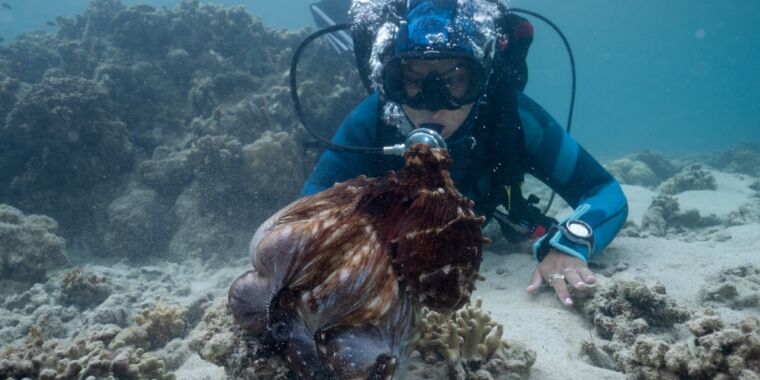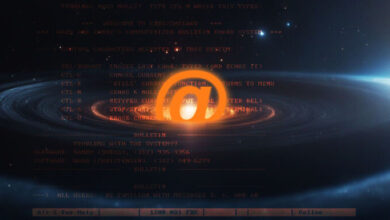Secrets of the Octopus takes us inside the world of these “aliens on Earth”


National Geographic/Disney/Craig Parry
With Earth Day fast approaching once again, it’s time for another new documentary from National Geographic and Disney+: Secrets of the Octopus. It’s the third in what has become a series, starting with the remarkable 2021 documentary Secrets of the Whales (narrated by Sigourney Weaver) and 2023’s Secrets of the Elephants (Natalie Portman as narrator). James Cameron served as producer on all three.
Secrets of the Octopus is narrated by Paul Rudd. Per the official synopsis:
Octopuses are like aliens on Earth: three hearts, blue blood and the ability to squeeze through a space the size of their eyeballs. But there is so much more to these weird and wonderful animals. Intelligent enough to use tools or transform their bodies to mimic other animals and even communicate with different species, the secrets of the octopus are more extraordinary than we ever imagined.
Each of the three episodes focuses on a specific unique feature of these fascinating creatures: “Shapeshifters,” “Masterminds,” and “Social Networks.” The animals were filmed in their natural habitats over 200 days and all that stunning footage is accompanied by thoughtful commentary by featured scientists. One of those scientists is Dr. Alex Schnell, a native Australian and self described storytelling who has worked at Macquarie University, the University of Cambridge, and the Marine Biological Laboratory, among other institutions. Her research focuses on the intelligence of marine animals, particularly cuttlefish and octopuses.
Ars caught up with Schnell to learn more.
Ars Technica: How did you become interested in studying octopuses?
Alex Schnell: I had this pivotal moment when I was young. I had the luxury of actually growing up on the beaches of Sydney so I would spend a lot of time in the water, in rock pools, looking at all the critters. When I was about five years old, I met my first octopus. It was such a monumental moment that opened up a completely different world for me. That’s the day I decided I wanted to be a marine biologist.
-
Alex Schnell prepares for a dive on the Great Barrier Reef
National Geographic for Disney/Craig Parry -
Alex Schnell SCUBA dives over a coral garden on the Great Barrier Reef, while an Australian research vessel floats on the surface above.
National Geographic for Disney/Craig Parry -
A Day octopus perched on corals on the Great Barrier Reef.
National Geographic/Disney/Richard Woodgett -
Director and DOP Adam Geiger operates a jib arm with Producer / Camera operator, Rory McGuinness, and Camera Assistant, Woody Spark.
National Geographic for Disney/Annabel Robinson -
Woody Spark preparing cameras and underwater housings with cinematographer Rory McGuinness.
National Geographic for Disney/Harriet Spark -
Alex Schnell observes a Mimic octopus (Thaumoctopus mimicus) while on a dive with wildlife photographer and local dive guide, Benhur Sarinda
National Geographic for Disney/Craig Parry -
A Mimic octopus, with striped skin patterning, stretches out all eight arms across black volcanic sand.
National Geographic for Disney/Craig Parry -
A Blue-ringed octopus (Hapalochlaena maculosa) displays bright blue rings, a warning that the venom in her bite is deadly.
National Geographic
Ars Technica: What is the focus of your research?
Alex Schnell: I’m a marine biologist that turned into a comparative psychologist—just a fancy word for studying the different minds of animals. What I’m really interested is how intelligence evolved, where and when. The octopus is the perfect candidate to answer some of these questions because they diverge from our own lineage over 550 million years ago. We share an ancestor that looked like a flat worm. So if the octopus shows glimmers of intelligence that we see in ourselves or in animals that are closely related to us, it reveals a lot about the patterns of evolution and how it evolved throughout the animal kingdom.
When you meet an octopus, you really get the sense that there is another being looking out at you. A few years ago, I worked with a team at London School of Economics to write a report reviewing the evidence of sentience in animals. Does the animal have the capacity to feel emotions? We found really strong evidence in octopuses and it ended up changing UK law. Now under UK law, we have to treat octopuses ethically and with compassion.
Ars Technica: One behavioral aspect the series explores is tool use by octopuses. I was struck by the scene where a little coconut octopus uses her clamshell both for shelter and as a shield. I’ve never seen that before.
Alex Schnell: Neither had I. Before we traveled to Indonesia on that shoot, I had read about that particular defensive tool use by the coconut octopus. This species will often be seen carrying around two halves of a coconut, like a mobile den or an RV home. And they use it as protection because they live in a very barren sandy landscape. So I was really excited to see that behavior unfold.
We got more than we bargained for, because in the clip that you mentioned, our coconut octopus was being threatened by this angry mantis shrimp. They pack a really powerful punch that’s been known to break through aquarium glass. And here we have this defenseless little octopus with no bones or anything. In that moment we witnessed her have this idea. She walked over to the shell and picked it up and dragged it back to her original spot and literally used it like a shield to fend off this angry mantis shrimp. She had imagined herself a shield. I saw her get an idea, she imagined it, and she walked over it and used it. I was so blown away that I was screaming with excitement underwater.
-
Rory McGuinnes, operating an underwater jib arm to film a colorful coral reef on the Lembeh Strait.
National Geographic for Disney/Adam Geiger -
Woody Spark tests the controls for the underwater camera-and-slider system
National Geographic for Disney/Adam Geiger -
Local dive guides Reifani and Benhur Sarinda observe a Coconut octopus (Amphioctopus marginatus) sheltering between two clam shells.
National Geographic for Disney/Adam Geiger -
Woody Spark uses the underwater camera-and-slider system to film a Coconut octopus sheltering between clam shells.
National Geographic for Disney/Adam Geiger -
An 8-foot Giant Pacific octopus (Enteroctopus dofleini) rests on the arms of tech diver and octopus enthusiast, Krystal Janicki, on a dive in the shallow waters off Vancouver Island.
National Geographic for Disney/Maxwel Hohn -
A Giant Pacific octopus crawls over the sandy seafloor in shallow waters
National Geographic for Disney/Maxwel Hohn -
Dr. C.E. O’Brien observes a resting Island octopus (Octopus insularis) on a dive in Turks and Caicos.
National Geographic for Disney/Adam Geiger
Ars Technica: At one point in the series you celebrate having a “conversation” with an octopus. How do octopuses communicate?
Alex Schnell: Octopuses generally communicate with changes to their skin. They can change the color and the texture of their skin in the blink of an eye, and they can also change their posture. What we’ve found with one particular species is that they have cross-species communication, so they collaboratively hunt with some reef fish. Again, I had only read about this behavior until I had a chance to see it in person.
I had this kind of playful idea while I was down there with a Day octopus named Scarlet, who was allowing me to follow her on a lot of her hunts. Because I was so close to her, I noticed she was missing little crabs here and there. Normally her fish hunting partner will do a head stand to point to where the missed food is. I thought, I wonder what’s going to happen if I just point at it, not expecting anything. To my astonishment, she responded and swum right over and looked where I had pointed.
So that’s what I mean by having a conversation with an octopus. I can’t change color sadly, but it’s as if she was responding to my pointing, my “referential signaling,” which is incredible because this is kind of what we see in humans and chimpanzees: this development of communication before language develops. Here we have this octopus responding to a human pointing.
Ars Technica: Scarlet actually reached out her little tentacle to you on multiple occasions; she seemed to recognize you and accept you.
Alex Schnell: I had had those moments before, the ET moment where you get to meet an octopus, and I’ve spoken to other avid divers and people who have a love for octopuses that have had similar experiences. The really special thing with this relationship that I had with Scarlet is that we were able to develop it over weeks and months. Every time I would return to her, she would appear to recognize me quickly and let me back into her world.
What continues to blow me away is that Scarlet grew to trust me really quickly. She reached out and shook my hand after 30 minutes of me watching her, and she let me swim alongside her as she hunted. This is a creature with no skeleton, no shell, no teeth, no claws to protect itself. And despite that extreme vulnerability, she quickly let her guard down. It’s like she was driven by curiosity and this need to reach out and connect, even with an alien creature like me.
Ars Technica: I was surprised to learn that octopuses have such short lifespans.
Alex Schnell: A lot people ask me if they lived longer, would they take over the world? Maybe. It’s life in the fast lane. They are essentially born as orphans because they don’t have any parents or siblings to guide them. They just drift off. They’re loners for most of their lives and they teach themselves. Everything is driven by this intense curiosity to learn. I think that’s why a lot of people have had these incredible moments with octopuses because even the fear or the vulnerability that they might feel is outweighed by a curiosity to interact.
-
Alex Schnell on the surface in full SCUBA gear.
National Geographic/Harriet Spark -
A Coconut octopus pokes an eye out from between partially buried clam shells. Her powerful suckers hold the two shells together for protection from passing predators.
National Geographic for Disney/Craig Parry -
Alex Schnell and Benhur Sarinda observe a Coconut octopus walking across the seafloor with clam shells held underneath her web.
National Geographic for Disney/Craig Parry) -
A tiny Coconut octopus reaches out to touch Alex Schnell’s hand.
National Geographic for Disney/Craig Parry -
An Algae octopus (Abdopus aculeatus) foraging amongst the algae and seagrass in Bunaken Marine Park.
National Geographic/Annabel Robinson -
Alex Schnell observing a Southern keeled octopus (Octopus berrima) on a night dive in Port Phillip Bay
National Geographic -
A Dorado octopus mother group with eggs
Schmidt Ocean Institute
Ars Technica: Do you find yourself having to be on guard about anthropomorphizing these amazing creatures a bit too much?
Alex Schnell: I think there’s a fine balance. As a trained comparative psychologist, we are taught to be really careful not to anthropomorphize and attribute human traits onto the animals that we see or that we work with. At the same time, I think that we’ve moved too far into a situation that Frans de Waal called “anthro-denialism.” Traits didn’t just sprout up in the human species. They have an evolutionary history, and while they might not be exactly the same in other animals, there are similarities. So sometimes we need to call it what it is. One of der Waal’s examples was researchers who described chimpanzees kissing as “mouth-to-mouth contact” because they didn’t want to anthropomorphize it. Come on guys, they’re kissing.
We do strive to see human traits in other animals. We watched cartoons growing up, we had pets around us, so it’s really hard not to. Our job is as comparative psychologists is to find really strong evidence for the similarities and the differences between the different minds of the animals that we share our planet with.
Ars Technica: What were some of the highlights for you, filming this documentary series?
Alex Schnell: It was challenging in the sense that when the production team first approached me, I was 38 weeks pregnant. So I went out into the field with a five-month-old baby. I was sleep-deprived, trying to go diving and also be on camera. I had worked on natural history films before, but always on the other side of the camera. So it was a steep learning curve.
But it was such a rewarding experience to be able to have the luxury of time to be out with these animals. I had no project because I was on maternity leave. Sometimes when you’re part of a project, you can get tunnel vision. “I’m going to see this particular behavior and that’s what I’m focusing on.” But I could be completely mindful in the moment with my time with octopuses and get to see how they interact in their natural environment. It opens up this incredible secret world that they have. I was seeing things that, yes, I’d read about some of them, but some I’d never heard of before. I think each episode in this series reveals secrets that will take your breath away.
Ars Technica: What is next for you?
Alex Schnell: I’m working on a project called One World, Many Minds. What this project strives to do is accentuate that, yes, we are one world, but there are many minds that make up our collective existence. I really want to showcase the minds of animals like the octopus or the cuttlefish or a big grouper, and show that we have traits that we can recognize, that we can connect with. That will help remove a barrier of otherness, and highlight our shared vulnerability and interconnectedness with animals.
Secrets of the Octopus premieres on Disney+ and Hulu on April 22, 2024.
Secrets of the Octopus official trailer.
Source link




